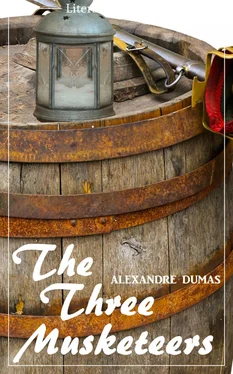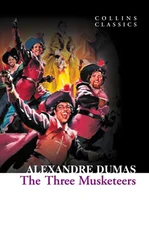For our young man had a steed which was the observed of all observers. It was a Bearn pony, from twelve to fourteen years old, yellow in his hide, without a hair in his tail, but not without windgalls on his legs, which, though going with his head lower than his knees, rendering a martingale quite unnecessary, contrived nevertheless to perform his eight leagues a day. Unfortunately, the qualities of this horse were so well concealed under his strange-colored hide and his unaccountable gait, that at a time when everybody was a connoisseur in horseflesh, the appearance of the aforesaid pony at Meung – which place he had entered about a quarter of an hour before, by the gate of Beaugency – produced an unfavorable feeling, which extended to his rider.
And this feeling had been more painfully perceived by young d'Artagnan – for so was the Don Quixote of this second Rosinante named – from his not being able to conceal from himself the ridiculous appearance that such a steed gave him, good horseman as he was. He had sighed deeply, therefore, when accepting the gift of the pony from M. d'Artagnan the elder. He was not ignorant that such a beast was worth at least twenty livres; and the words which had accompanied the present were above all price.
"My son," said the old Gascon gentleman, in that pure Bearn PATOIS of which Henry IV could never rid himself, "this horse was born in the house of your father about thirteen years ago, and has remained in it ever since, which ought to make you love it. Never sell it; allow it to die tranquilly and honorably of old age, and if you make a campaign with it, take as much care of it as you would of an old servant. At court, provided you have ever the honor to go there," continued M. d'Artagnan the elder, " – an honor to which, remember, your ancient nobility gives you the right – sustain worthily your name of gentleman, which has been worthily borne by your ancestors for five hundred years, both for your own sake and the sake of those who belong to you. By the latter I mean your relatives and friends. Endure nothing from anyone except Monsieur the Cardinal and the king. It is by his courage, please observe, by his courage alone, that a gentleman can make his way nowadays. Whoever hesitates for a second perhaps allows the bait to escape which during that exact second fortune held out to him. You are young. You ought to be brave for two reasons: the first is that you are a Gascon, and the second is that you are my son. Never fear quarrels, but seek adventures. I have taught you how to handle a sword; you have thews of iron, a wrist of steel. Fight on all occasions. Fight the more for duels being forbidden, since consequently there is twice as much courage in fighting. I have nothing to give you, my son, but fifteen crowns, my horse, and the counsels you have just heard. Your mother will add to them a recipe for a certain balsam, which she had from a Bohemian and which has the miraculous virtue of curing all wounds that do not reach the heart. Take advantage of all, and live happily and long. I have but one word to add, and that is to propose an example to you – not mine, for I myself have never appeared at court, and have only taken part in religious wars as a volunteer; I speak of Monsieur de Treville, who was formerly my neighbor, and who had the honor to be, as a child, the play-fellow of our king, Louis XIII, whom God preserve! Sometimes their play degenerated into battles, and in these battles the king was not always the stronger. The blows which he received increased greatly his esteem and friendship for Monsieur de Treville. Afterward, Monsieur de Treville fought with others: in his first journey to Paris, five times; from the death of the late king till the young one came of age, without reckoning wars and sieges, seven times; and from that date up to the present day, a hundred times, perhaps! So that in spite of edicts, ordinances, and decrees, there he is, captain of the Musketeers; that is to say, chief of a legion of Caesars, whom the king holds in great esteem and whom the cardinal dreads – he who dreads nothing, as it is said. Still further, Monsieur de Treville gains ten thousand crowns a year; he is therefore a great noble. He began as you begin. Go to him with this letter, and make him your model in order that you may do as he has done."
Upon which M. d'Artagnan the elder girded his own sword round his son, kissed him tenderly on both cheeks, and gave him his benediction.
On leaving the paternal chamber, the young man found his mother, who was waiting for him with the famous recipe of which the counsels we have just repeated would necessitate frequent employment. The adieux were on this side longer and more tender than they had been on the other – not that M. d'Artagnan did not love his son, who was his only offspring, but M. d'Artagnan was a man, and he would have considered it unworthy of a man to give way to his feelings; whereas Mme. d'Artagnan was a woman, and still more, a mother. She wept abundantly; and – let us speak it to the praise of M. d'Artagnan the younger – notwithstanding the efforts he made to remain firm, as a future Musketeer ought, nature prevailed, and he shed many tears, of which he succeeded with great difficulty in concealing the half.
The same day the young man set forward on his journey, furnished with the three paternal gifts, which consisted, as we have said, of fifteen crowns, the horse, and the letter for M. de Treville – the counsels being thrown into the bargain.
With such a VADE MECUM d'Artagnan was morally and physically an exact copy of the hero of Cervantes, to whom we so happily compared him when our duty of an historian placed us under the necessity of sketching his portrait. Don Quixote took windmills for giants, and sheep for armies; d'Artagnan took every smile for an insult, and every look as a provocation – whence it resulted that from Tarbes to Meung his fist was constantly doubled, or his hand on the hilt of his sword; and yet the fist did not descend upon any jaw, nor did the sword issue from its scabbard. It was not that the sight of the wretched pony did not excite numerous smiles on the countenances of passers-by; but as against the side of this pony rattled a sword of respectable length, and as over this sword gleamed an eye rather ferocious than haughty, these passers-by repressed their hilarity, or if hilarity prevailed over prudence, they endeavored to laugh only on one side, like the masks of the ancients. D'Artagnan, then, remained majestic and intact in his susceptibility, till he came to this unlucky city of Meung.
But there, as he was alighting from his horse at the gate of the Jolly Miller, without anyone – host, waiter, or hostler – coming to hold his stirrup or take his horse, d'Artagnan spied, though an open window on the ground floor, a gentleman, well-made and of good carriage, although of rather a stern countenance, talking with two persons who appeared to listen to him with respect. D'Artagnan fancied quite naturally, according to his custom, that he must be the object of their conversation, and listened. This time d'Artagnan was only in part mistaken; he himself was not in question, but his horse was. The gentleman appeared to be enumerating all his qualities to his auditors; and, as I have said, the auditors seeming to have great deference for the narrator, they every moment burst into fits of laughter. Now, as a half-smile was sufficient to awaken the irascibility of the young man, the effect produced upon him by this vociferous mirth may be easily imagined.
Nevertheless, d'Artagnan was desirous of examining the appearance of this impertinent personage who ridiculed him. He fixed his haughty eye upon the stranger, and perceived a man of from forty to forty-five years of age, with black and piercing eyes, pale complexion, a strongly marked nose, and a black and well-shaped mustache. He was dressed in a doublet and hose of a violet color, with aiguillettes of the same color, without any other ornaments than the customary slashes, through which the shirt appeared. This doublet and hose, though new, were creased, like traveling clothes for a long time packed in a portmanteau. D'Artagnan made all these remarks with the rapidity of a most minute observer, and doubtless from an instinctive feeling that this stranger was destined to have a great influence over his future life.
Читать дальше












